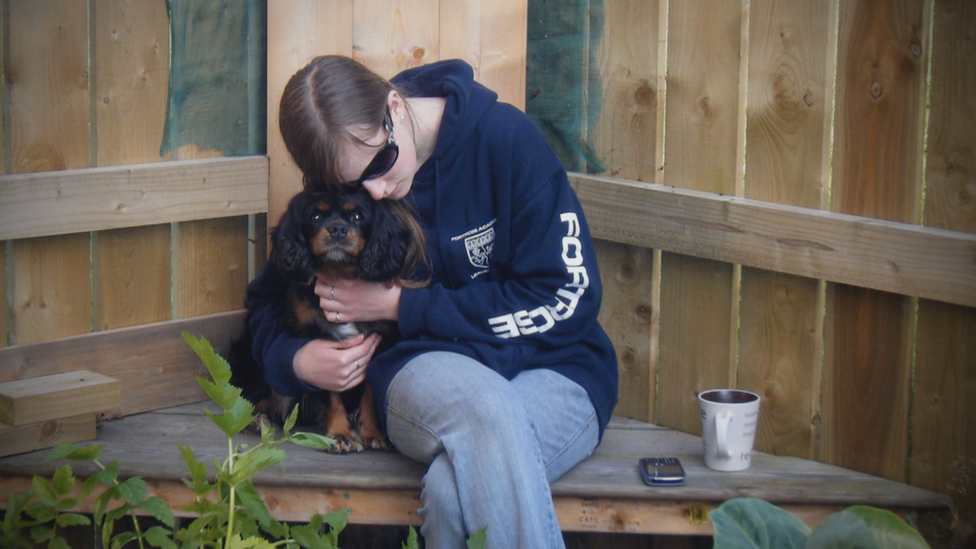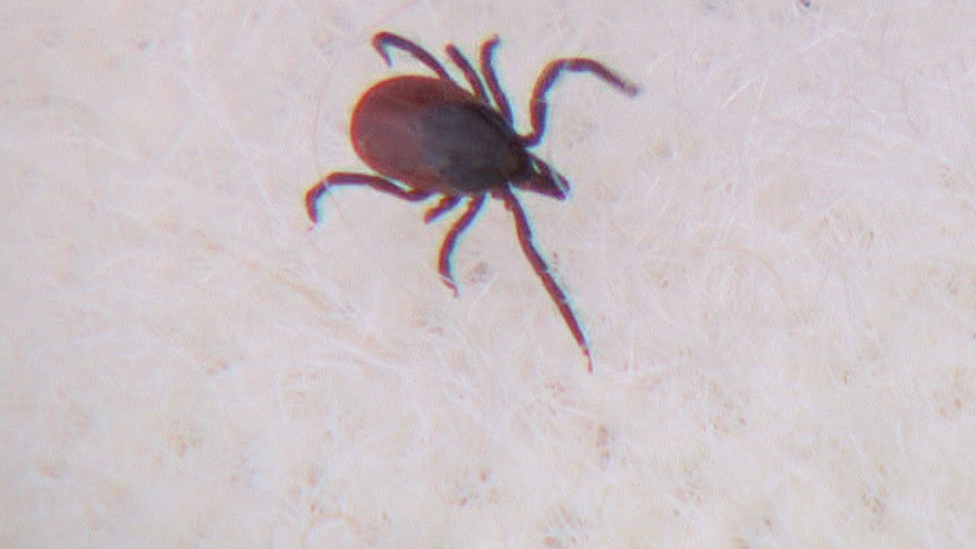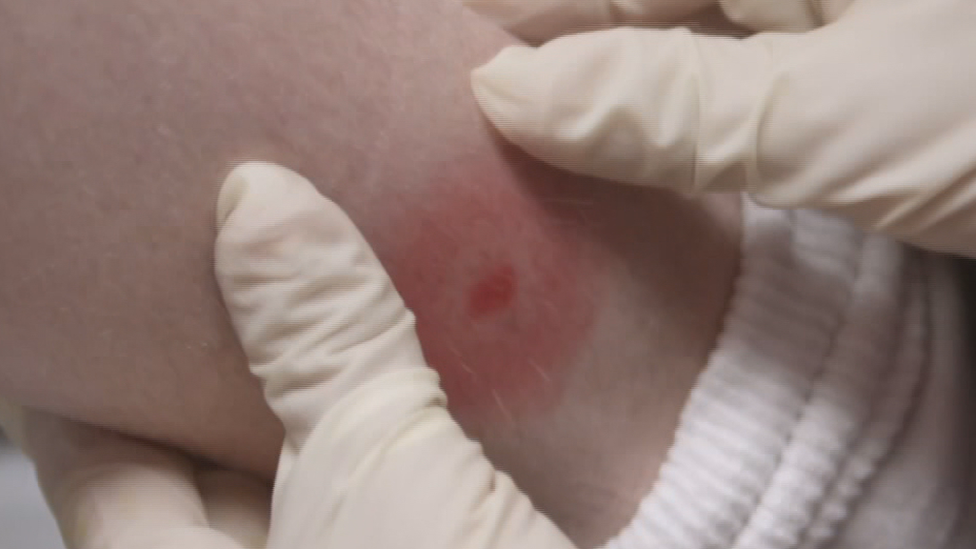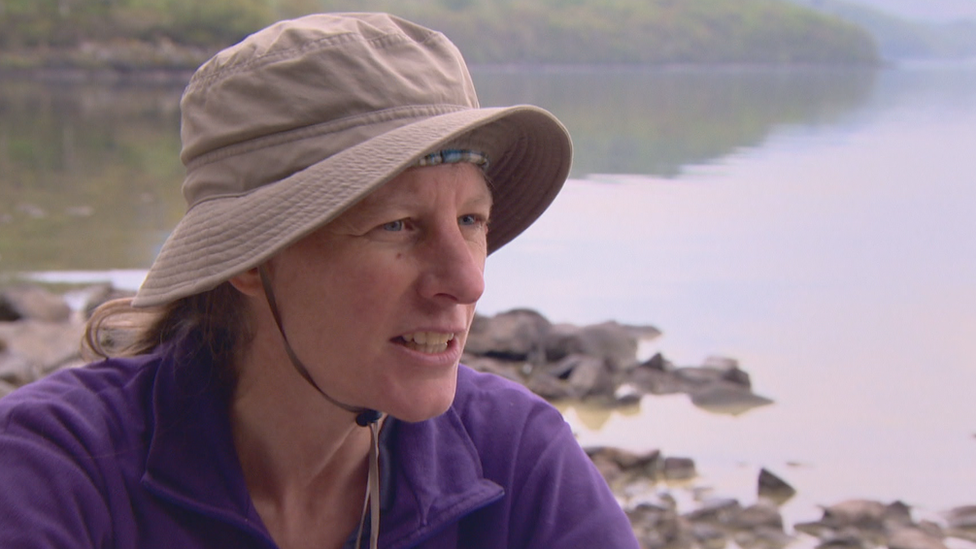Lyme disease has 'dominated' my life
- Published
Morven-May MacCallum is still suffering nine years after starting treatment
Morven-May MacCallum says her life is still "completely dominated" by Lyme disease, nine years on from starting treatment.
About 200 people a year in Scotland are recorded with the disease but the true number is thought to be much higher.
The disease is a bacterial infection spread by a bite from an infected tick.
Scotland's chief medical officer has written to all of the country's NHS boards and GPs urging them to be vigilant about Lyme disease.
Catherine Calderwood's advice comes amid an increase in the number of cases of the debilitating condition
She said doctors should be alert to the risks if the patient has a history of walking in the outdoors in areas where there are ticks.
Ms Calderwood said it was hard for GPs because a patient's symptoms could be vague - tiredness, muscle ache, maybe a runny nose - and the likelihood of it being Lyme disease was quite small.
There is a distinctive rash which is shaped like a bullseye but not everyone gets one and this can make diagnosis tricky.
Health guidelines say for most people a course of antibiotics is an effective treatment but many claim they have a chronic form of the disease that persists with severe symptoms.
Such a condition is not widely accepted by doctors.

Morven suddenly became ill when she was 14
Morven-May, from the Black Isle, is now 26 but she was just 14 when she suddenly fell ill.
"I was hugely into mountain biking, horse riding, I'd go up Munros at the weekend," she told the BBC Disclosure programme Under The Skin.
"I was in training for climbing up the Mountain Morven up in Caithness. I was one of these really annoying people who never, ever stopped. I just kept going. I just bounced everywhere."
All that changed when what started off feeling like the flu became more serious.
She said: "I'd fall asleep in the school bus and I would come home and I would just collapse in a heap on the couch. I literally got up, went to school and collapsed in utter exhaustion each day.
"It got to the point where I had to leave school at 16 because by the time I got home from school each day I was so weak I couldn't physically walk."

Lyme disease is a bacterial infection spread by ticks
Her doctors believed she was suffering from chronic fatigue syndrome but then a neighbour - who had experienced Lyme disease - intervened.
Morven-May said: "They'd seen me struggling to walk, and they said to my mother 'have you considered Lyme disease?'.
"She really researched it and she presented that research to the doctors and to specialists that I saw, and they refused again to accept that it could be Lyme disease because all my blood tests kept coming back as being negative."
It was eventually confirmed by a Lyme disease expert at a private clinic in England.
Morven-May said: "She clinically diagnosed me after investigating my history and then she ordered blood tests which went to America and to Germany, and they came back positive with Lyme disease."
It is now nine years since she started treatment but she said her life was still "completely dominated" by the disease.
"There's not a single second in which I feel like it's not in control of me, and that it's not monopolising my body," she said.
Lyme Disease

There is often a distinctive bullseye rash
Ticks that may cause Lyme disease are found all over the UK
High-risk areas include grassy and wooded areas in southern England and the Scottish Highlands
To reduce the risk of being bitten, cover your skin, tuck your trousers into your socks, use insect repellent and stick to paths
If you are bitten, remove the tick with fine-tipped tweezers or a tick-removal tool found in chemists
Clean the bite with antiseptic or soap and water
The risk of getting ill is low as only a small number of ticks are infected with the bacteria that cause Lyme disease
You don't need to do anything else unless you become unwell
You should go to your GP if you've been bitten by a tick or visited an area in the past month where infected ticks are found and you get flu-like symptoms or a circular red rash
These symptoms can include feeling hot and shivery, headaches, aching muscles or feeling sick
Lyme was only recorded for the first time in the 1970s, by doctors in the USA.
Reported cases are on the rise in the UK and and the Highlands have been identified as a hot spot for infections.
Dr James Douglas, a GP in Lochaber, regularly sees patients with the disease.
He told BBC Scotland's Disclosure that the tick bite would be the first obvious sign but if the bacteria went deeper into the body it could cause quite significant illness.
"It can affect primarily the nervous system, so it can start causing paralysis," he said.
"It can affect the joints and when it gets to this stage antibiotics certainly can get rid of the bacteria but in a percentage of people they're left with some really quite debilitating symptoms for quite some considerable time."

Dr Lucy Gilbert is a tick expert but a doctor refused to believe her about the Lyme disease
Dr Lucy Gilbert, from the University of Glasgow, is a leading expert on ticks and Lyme disease.
She said that when she was bitten her doctor refused to accept it could be Lyme disease.
Dr Gilbert said: "It was really frustrating, because I knew I had it. I'd found a tick on me, I knew it was the right type of tick, it had been on for at least 24 hours, it was from an area where I knew other people had got Lyme disease previously. I'd got the bullseye rash, which is supposed to be diagnostic."
Later, another doctor did prescribe intravenous antibiotics and she made a full recovery.
Most doctors say that definitive evidence of chronic or long-term Lyme disease has not been established.
Dr Douglas said there were "scientific uncertainties" in understanding how different people's immune systems responded to the bacterium.
He said: "I think what's happening is the bacteria is no longer there but I think their immune system is still very active and that's where they're getting these symptoms from because of the activity of the immune system, and almost the body kind of fighting itself."

Disclosure: Under the Skin is on BBC 1 Scotland at 20:30 on Monday 17 June and on the iplayer.
Previous Disclosure investigations include: